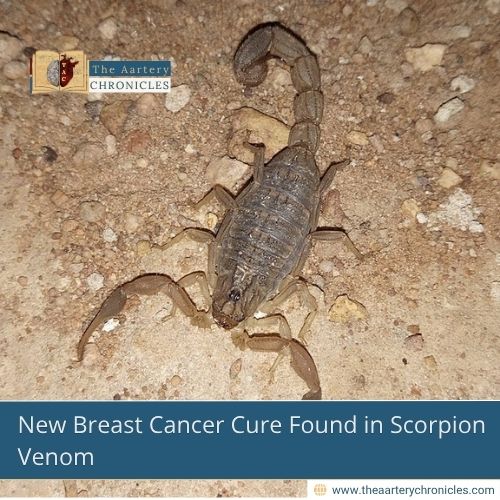

New Breast Cancer Cure Found in Scorpion Venom
Scientists from the University of São Paulo in Brazil have found a promising new way to treat breast cancer using a molecule found in the Amazonian Scorpion Venom. This molecule, named BamazScplp1, has shown the ability to kill breast cancer cells while doing minimal harm to healthy cells in lab tests.
This finding, presented during FAPESP Week France, could potentially lead to more effective and less harmful treatment options for breast cancer patients in the future.
What Is BamazScplp1 and How Does It Work?
BamazScplp1 is a peptide, or small protein, taken from the venom of the Brotheas amazonicus scorpion found in the Amazon. It belongs to a group of enzymes known as serine proteases, which are capable of breaking down proteins.
In early laboratory studies, this molecule was shown to destroy breast cancer cells by triggering necrosis—a form of cell death where cells break apart and die. While necrosis may sound harmful, in cancer treatment, it’s a powerful way to destroy tumour cells quickly.
What’s especially notable is that the effects of BamazScplp1 were similar to those of paclitaxel, one of the most commonly used chemotherapy drugs. This means the venom-derived compound could serve as an alternative or even a companion to current chemotherapy treatments.
Making the Molecule Without Using Scorpions
To avoid the ethical and practical challenges of extracting venom from live scorpions, the research team used a method called heterologous expression. In simple terms, they inserted the gene that creates the molecule into yeast cells, which then produce the protein in large amounts.
They chose a yeast strain known as Pichia pastoris, commonly used in biotech labs for producing proteins safely and efficiently. This approach not only makes large-scale production possible but also ensures no harm is done to scorpions making it both ethical and sustainable.
From Lab to Life
While this research offers hope, it is still in its early stages. More laboratory studies, animal testing, and eventually human clinical trials are needed to confirm that BamazScplp1 is safe and effective for real-world use.
If all goes well, this molecule could pave the way for a new generation of cancer treatments based on nature. Unlike traditional chemotherapy, which can damage healthy cells and cause serious side effects, venom-based therapy may offer a more targeted and less invasive approach.
Conclusion
This discovery shows the incredible potential of natural substances in the fight against cancer. Though much more research is required, the use of scorpion venom in cancer therapy may one day offer millions of breast cancer patients a safer, more effective path to recovery.
As science continues to explore nature’s pharmacy, innovations like these bring us one step closer to turning deadly diseases into treatable conditions using solutions that nature itself has been hiding in plain sight.
Source: Inputs from various media Sources

Priya Bairagi
Reviewed by Dr Aarti Nehra (MBBS, MMST)
I’m a pharmacist with a strong background in health sciences. I hold a BSc from Delhi University and a pharmacy degree from PDM University. I write articles and daily health news while interviewing doctors to bring you the latest insights. In my free time, you’ll find me at the gym or lost in a sci-fi novel.








